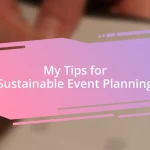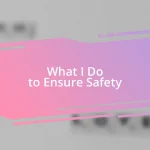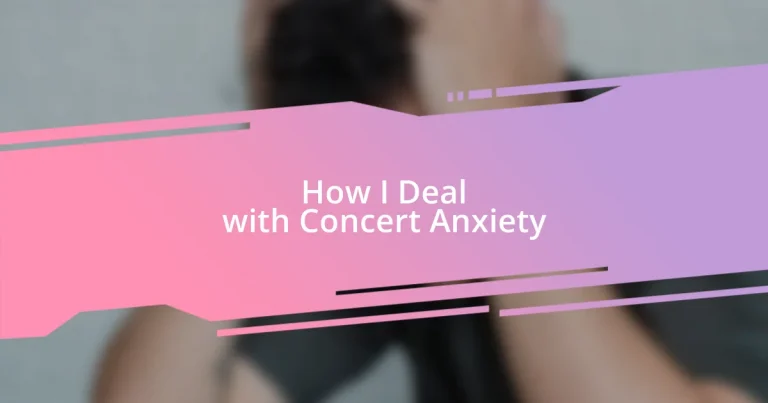Key takeaways:
- Concert anxiety is a common, personal experience that can manifest in various physical symptoms such as rapid heartbeat and sweating.
- Effective preparation strategies, including checklists and familiarizing oneself with the venue, can significantly reduce anxiety before a performance.
- Long-term management techniques like mindfulness practices, regular exercise, and journaling contribute to better handling of concert anxiety over time.
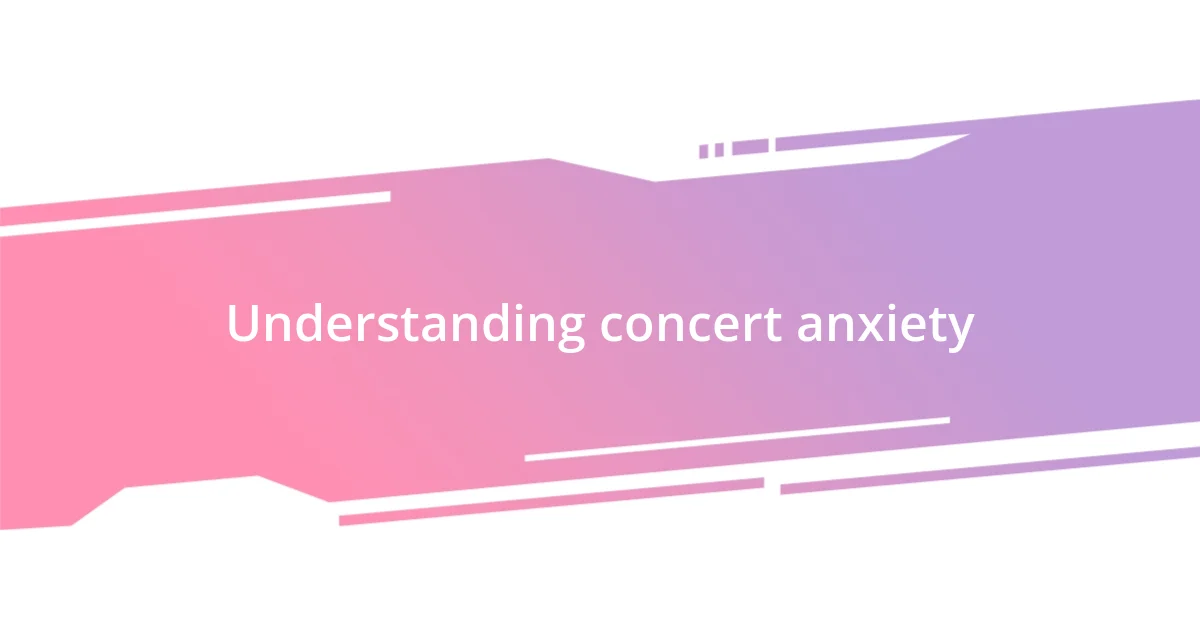
Understanding concert anxiety
Concert anxiety can feel overwhelming, and I truly understand that sensation. The heart races, palms sweat, and suddenly, the thought of being in front of a crowd seems daunting. Have you ever experienced that anxious gulp as you wait for the lights to dim? I know I have.
In my experience, the anticipation leading up to a concert sometimes eclipses the excitement of the event itself. The fear of forgetting lyrics or stumbling over my words starts to cloud my mind. It’s almost as if that little voice in my head is whispering doubts: “What if I completely freeze up?” Reflecting on those moments, I’ve learned that recognizing these feelings is the first step in managing them.
What’s fascinating about concert anxiety is how personal it can be. Some may find solace in deep breaths or visualization, while others might require a pep talk from a friend. I often ask myself, “What helped me the last time I felt this way?” Sharing strategies and experiences with fellow musicians can transform that anxiety into a shared journey, reminding us we’re not alone in this.
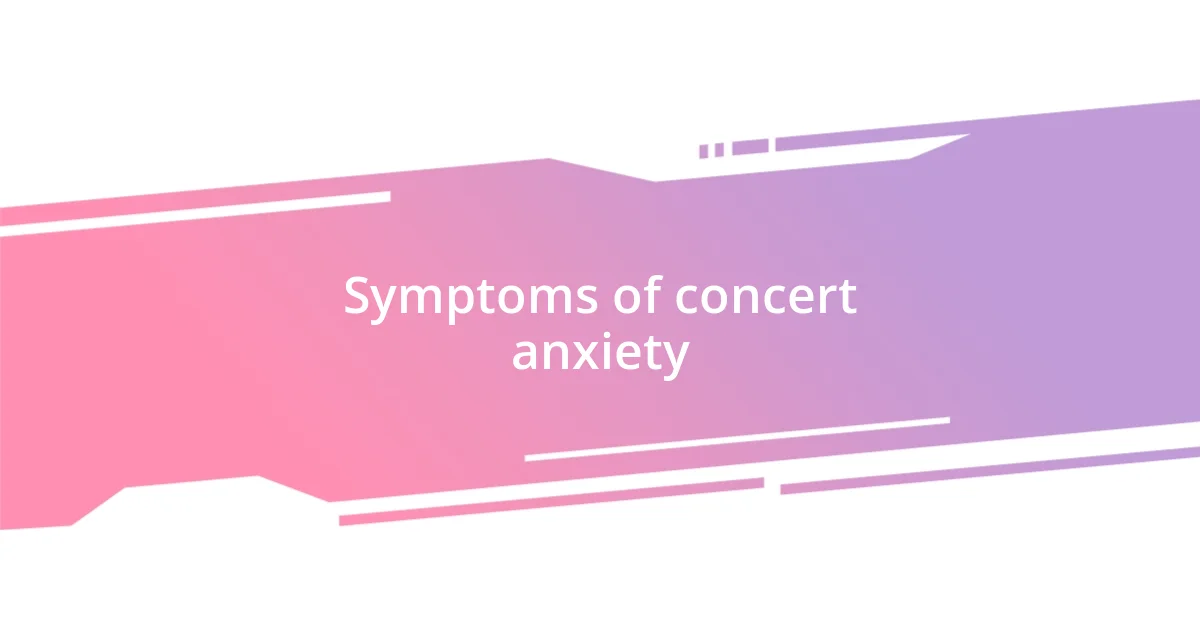
Symptoms of concert anxiety
Concert anxiety can manifest in various ways, often catching us off guard. I remember one particular performance when I felt my heart pounding like a drum, while my hands trembled, making it difficult to hold onto my instrument. It’s a mix of physical symptoms that remind us how real the anxiety can be.
Here are some common symptoms I’ve noticed:
- Rapid heartbeat or palpitations
- Sweating, especially in the palms
- Dry mouth or increased thirst
- Nausea or stomach discomfort
- Shaking or trembling limbs
Identifying these symptoms can often be the first step toward coping. Each experience brings its own set of feelings, weaving nervous anticipation with excitement, reminding me that managing concert anxiety is a personal journey, unique to each individual.
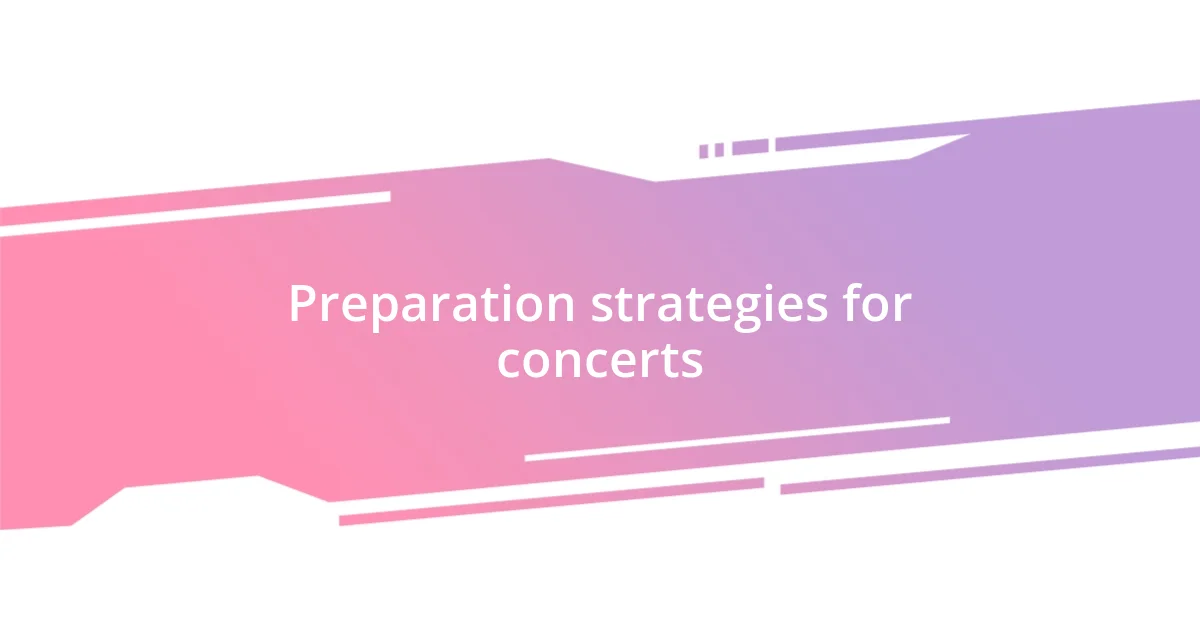
Preparation strategies for concerts
I’ve discovered that proper preparation significantly eases concert anxiety. One strategy I find particularly useful is creating a detailed checklist. This checklist includes everything I need to remember, from setting up my equipment to warming up my voice. By physically checking off items, I feel a sense of control, which is incredibly comforting.
Another important part of my prep involves familiarizing myself with the venue. I often visit the space beforehand or at least look up photos and videos online. Knowing what the stage looks like helps me visualize my performance and reduces unexpected surprises. I remember walking through a new venue once—just taking in the dimensions and energy helped quell my jitters on the actual day.
Lastly, I can’t emphasize enough the benefits of practicing mindfulness and relaxation techniques leading up to a concert. Whether it’s meditation, yoga, or even simple breathing exercises, carving out a few minutes each day helps ground me. I once spent the morning before a big performance in a quiet park, taking deep breaths and focusing on nature. That peaceful moment set a positive tone for my entire day.
| Preparation Strategy | Description |
|---|---|
| Creating a Checklist | A detailed list of tasks and items to ensure nothing is overlooked, providing a sense of control. |
| Familiarizing with the Venue | Visiting or researching the concert space ahead of time to reduce uncertainty on performance day. |
| Practicing Mindfulness | Engaging in relaxation techniques like meditation or deep breathing to help manage anxiety. |
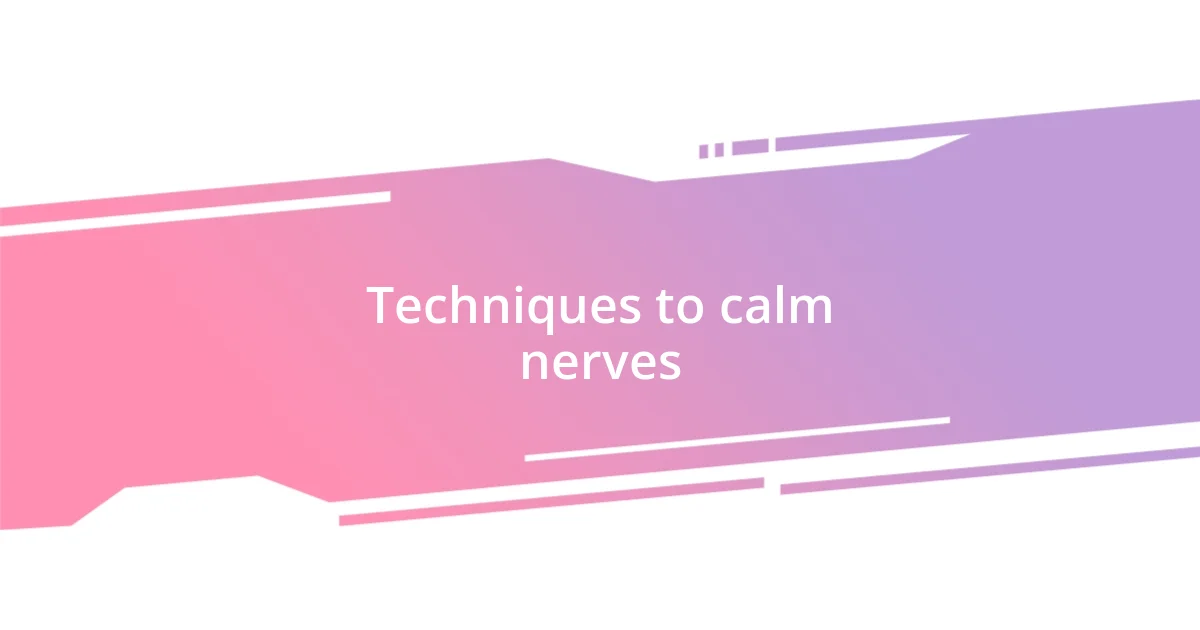
Techniques to calm nerves
When it comes to calming nerves before a concert, I’ve found that deep breathing exercises work wonders. I remember standing backstage once, feeling the all-too-familiar tension creeping in. Taking a moment to breathe in for four counts, holding for four, and exhaling for six helped shift my focus from my racing thoughts to the rhythm of my breath. It’s fascinating how something so simple can transform your mindset.
Another technique I often rely on is visualization. Before a performance, I close my eyes and picture myself on stage, delivering my best. I can still recall the time I envisioned the support of my friends and family in the audience; it filled me with confidence and warmth. Sometimes, I ask myself: how do I want this performance to feel? Imagining success not only soothes anxiety but also primes me for a positive experience.
Lastly, I find solace in connecting with fellow musicians. Sharing our fears and strategies often lightens the mental load. I once had a heart-to-heart with a bandmate just hours before a show, and it struck me how we all face similar struggles. It made me realize that I’m not alone; talking it out can shift the atmosphere from tense to supportive. How often do we underestimate the power of camaraderie in moments of anxiety? In my experience, it can be a game changer.
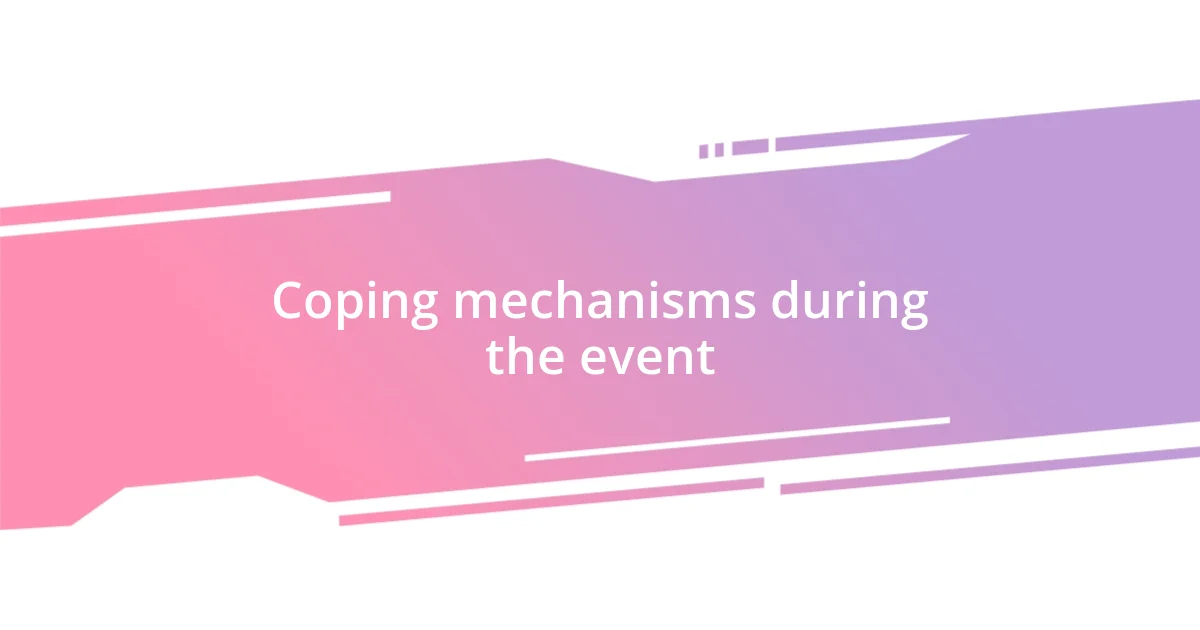
Coping mechanisms during the event
During a concert, I lean heavily on grounding techniques to keep my nerves in check. For instance, I often anchor myself with tactile reminders, like gripping the microphone or feeling the weight of my guitar. There was a memorable night when, overwhelmed by the crowd’s energy, taking a moment to focus on the cool metal of the mic helped me feel present, transforming my anxious thoughts into excitement. Isn’t it interesting how something physical can redirect our mental state?
I also utilize music to create a mental cocoon. Right before stepping on stage, I like to listen to my favorite upbeat tracks, ones that resonate with me. I’ll never forget the rush I felt when I played a song by my favorite artist, and it suddenly flooded me with confidence. It’s like a mini revival for my spirit. Have you ever noticed how a good song can lift your mood instantly? I find that immersing myself in familiar sounds can really boost my morale and ease the pre-show jitters.
Engaging with the audience before performing is another method I cherish. Whether it’s a quick chat or a friendly wave, making that connection turns my focus outward, away from my internal fears. I vividly recall a time when I awkwardly joked with the front row; their laughter instantly lifted the tension in the air, and I suddenly felt part of a shared experience rather than a solo act. It’s incredible how quickly a little interaction can transform anxiety into belonging, don’t you think?
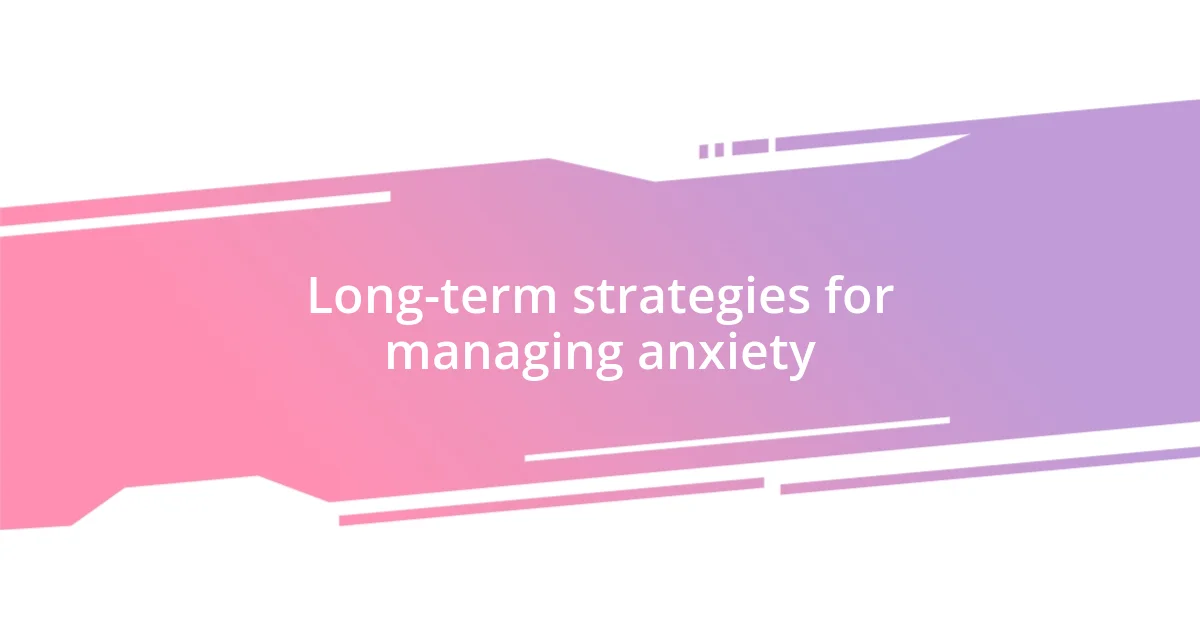
Long-term strategies for managing anxiety
When I think about long-term strategies for managing concert anxiety, I can’t help but reflect on the importance of developing a consistent mindfulness practice. For me, daily meditation has become a sanctuary. Initially, I approached it skeptically, wondering how sitting in silence could ever help with my on-stage nerves. However, over time, I’ve noticed that just ten minutes of focused breathing not only calms my mind but also equips me to handle stressful situations with a greater sense of clarity. Isn’t it curious how taking quiet moments away from chaos can sharpen our preparedness for performance?
On a more structured level, I’ve begun incorporating physical activity into my routine. Regular exercise, whether it’s a brisk walk or a yoga session, has a way of releasing pent-up anxiety. I remember the days when I’d find myself pacing nervously before a show; now, a good workout energizes me instead of depleting my confidence. It’s almost like turning my nervous energy into something productive—how often do we think of our anxiety as a source of potential vigor?
Lastly, I can’t stress the significance of journaling in my journey to manage anxiety. Putting pen to paper has been incredibly cathartic. I recall one particularly challenging rehearsal where I vented my fears about an upcoming performance. Writing it down transformed my worries into tangible thoughts I could analyze and confront. Have you ever considered how documenting your feelings can create a space of understanding? In my experience, this simple act allows for self-reflection and opens up pathways to solutions that feel personal and achievable.









